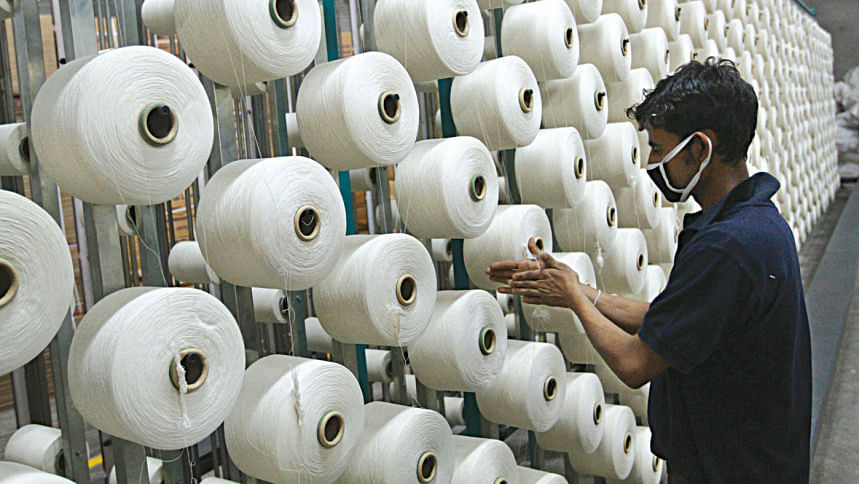Spinners left in the lurch

Many garment makers in Bangladesh are not honouring their primary contracts for buying yarn from local spinners as work orders from abroad have decreased amid volatility in the global economy.
As of yesterday, 50 garment makers were yet to formalise their proforma invoice (PI) as a letter of credit (LC).
The PI is a primary agreement made between buyers and sellers before the delivery of goods, which is yarn in this case, while the LC is the final purchase agreement based on the PI.
At present, the overall value of suspended PIs is more than $61 lakh, according to the Bangladesh Textile Mills Association (BTMA).
Monsoor Ahmed, chief executive officer of the BTMA, said the garment makers' failure to honour their PIs is an indication that the inflow of work orders from international retailers and brands is slowing.
It also indicates that garment makers are again depending on imported yarn as the narrow price gap with local varieties means they can make up for the high input cost by delivering higher quality products.
Similarly, the lack of work orders means they now have more time to fulfil shipments, doing away with the need to buy from local spinners to ensure shorter lead-times.
However, the actual value of suspended PIs is likely higher than that recorded by the monitoring cell of the BTMA, Ahmed said, citing how many millers do not lodge complaints in fear of losing business.
Two months ago, the BTMA formed a separate monitoring cell to get a real picture on suspended PIs.
Besides, yarn stockpiling is again taking place at the mills as many garment makers are not collecting their orders despite previously having agreed upon a PI.
The trend started from July this year, when work orders from abroad were showing an upward trend as inflationary pressure was easing in the western world along with the rebound of their economies.
And as the work orders were coming in aplenty, yarn prices shot up in local markets.
At the time, the widely consumed 30 count yarn was booked between $3.60 and $3.65 per kilogramme (kg) in domestic markets.
But the upward trend in work orders did not last long after that and the prices of both cotton and yarn started falling worldwide, for which local garment markers did not show interest in honouring their PIs.
Moreover, the garment makers found they could buy yarn from other countries, especially India, at lower prices and this encouraged them to cancel their PIs with local suppliers, Ahmed added.
Razeeb Haider, managing director of Outpace Spinning Mills, said the inflow of work orders jumped in June-July but recently started declining as some were not officially confirmed by the global buyers.
"This can happen in trade as the PIs have a validity period of 10 to 15 days," he said, adding that at least half of the commitment was met by buyers in some cases.
Take for example that a garment maker committed to procuring 20 tonnes of yarn from local spinners but ultimately sourced 10 tonnes as their buyer reduced the work order.
Likewise, the same could occur if the garment maker chooses to procure the yarn from India instead.
Yarn prices have increased in local markets as the prices of gas and power nearly doubled in February.
Currently, the widely consumed 30 count yarn is being sold between $3.20 per kg and $3.30 per kg in local markets, garment exporters said.
Md Shahidullah Azim, vice-president of the Bangladesh Garment Manufacturers and Exporters Association, echoed the same.
He pointed out that the price gap between Bangladeshi yarn and Indian yarn varies between 50 cents to just $1 per kg.
As a result of the meagre difference, many garment makers choose to buy Indian yarn.
"But we expect the inflow of work orders will start increasing from December as the global economy is gradually heading towards stability," he added.
Similarly, Md Fazlul Hoque, vice-president of the BTMA, said the reduced inflow of work orders has seriously affected yarn sales in local markets.

 For all latest news, follow The Daily Star's Google News channel.
For all latest news, follow The Daily Star's Google News channel. 





Comments